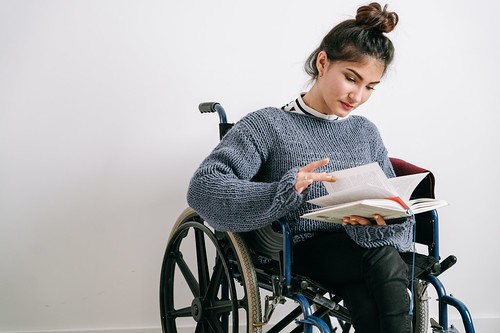How to Request Accommodations in College
Last updated June 27, 2024
If you’re a college student with a disability, you are entitled by law to receive academic support and reasonable accommodations from your school. However, the process of receiving such accommodations in college will be different than in high school, as you will need to start the process yourself. We break down what you should know about requesting accommodations in college and where to receive support along the way!
(Lee este artículo en español aquí!)
What accommodations are commonly available to college students with disabilities?
While specific accommodations and resources offered will vary by college, these are some of the most common:
- Testing accommodations, such as extended test taking times, tests in different formats, or different settings to take tests in.
- Mobility accommodations, such as parking accommodations and assistance getting to class.
- Course texts in larger print sizes, as well as in audiobook and braille formats.
- Assigned notetakers or scribes for class lectures.
- Sign language interpreters.
- Assistive listening devices.
How to request accommodations in college
Individualized Education Programs (IEPs) or 504 Plans from your time in high school unfortunately don’t carry over to college, so it’s important to note again that college students must take the initiative to request any accommodations.
Nearly all college campuses have an office or department designed specifically to support students with disabilities, typically known as the Disability Resource Center (DRC). Depending on your school, this office or department may go by a different name, such as the Disability Services Office or Center for Student Accessibility. This center is where you will start the process of requesting accommodations.
A representative from your school’s DRC can meet with you to determine what accommodations you need and work with your professors and other faculty to make sure these accommodations are implemented in the classroom. Beyond accommodations, your DRC can also offer additional support and resources that can assist you throughout your time in school.
While each college will have different processes to request accommodations, here’s an overview of what to do and expect during this time:
Email or call your DRC to begin the process
The first step of requesting accommodations will likely be to complete an intake or application form, also known as a “self-report,” that includes some information and context about how your disability or diagnosis affects you physically, mentally, and academically. Being honest here is essential–it will help your DRC representative ensure you receive the support and accommodations you need. In addition to your self-report, you will also be asked to submit documentation (no more than two to three years old) of your disability. This can include things like doctor’s notes, audiograms, medical reports, psychological evaluations, and your IEP or 504 Plan from high school.
Note: It’s crucial to start this process as early as possible, since some schools will require a month’s time to get your accommodations set in place.

Schedule an appointment with your DRC
Once you submit all necessary paperwork, you can schedule an appointment with your school’s DRC. During this time, you can explain or give additional context on things within your self-report, request specific accommodations, and learn about other services and forms of support your DRC offers. The DRC will take some time to review your case and determine which accommodations will be provided to you. They will notify you of their decision and help you to work with your professors to ensure your accommodations are implemented in your classes.
Stay in contact with your DRC
Your school’s DRC is there to support you! If you don’t receive your approved accommodations, want to request additional accommodations, or make adjustments to your current accommodations, be sure to get in touch with your DRC. Remember, it is your legal right to receive accommodations in college, so don’t hesitate to check in with your DRC when you need support.
Have any questions about accessing accommodations, taking college classes, or just need some support? Text #College to 33-55-77 to chat with one of our advisors. If you're using a mobile device, click here to have the text message set up for you!